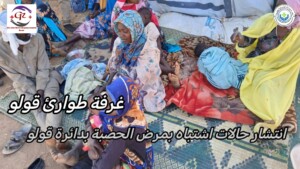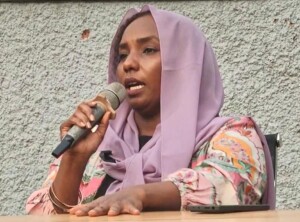COVID-19 cases on the rise in Sudan as second wave continues
Sudan has seen a fivefold increase in COVID-19 infections as the country’s second wave of infections continues. Following the University of Khartoum earlier this week, the University of El Gezira now also confirmed its first case among university students.
 File photo
File photo
Sudan has seen a fivefold increase in COVID-19 infections as the country’s second wave of infections continues. Following the University of Khartoum earlier this week, the University of El Gezira now also confirmed its first case among university students.
The Sudanese Ministry of Health reported 65 newly confirmed COVID-19 cases and one death on Sunday, an increase of eight cases from November 7 when 57 cases were confirmed. This brings the total cumulative number of confirmed infections since the beginning of the pandemic to 14,155 with 1,116 deaths and 9,492 recoveries.
The UN Office for the Coordination of Humanitarian Affairs (OCHA) has warned that these numbers constitute a fivefold increase from around 10 cases per day at the start of November to around 50 cases per day at the end of the first week.
Last week, hospital director Howeida El Hasan warned that there is a large number of unrecorded cases during the interview in which she called on the Sudanese government to develop a new protocol to deal with the pandemic during the country’s second wave of COVID-19 infections, especially to protect medical and health personnel.
The ministry’s epidemiological report indicated that seven out of Sudan’s 18 states recorded new cases. Of the 65 new cases, 50 were recorded in Khartoum, nine in neighbouring El Gezira, and two in the northern River Nile state while Kassala, Northern State, White Nile state, and South Kordofan each recorded one new case.
The Ministry of Health in the Red Sea state announced separately that nine new coronavirus infections were recorded last week, including two travellers.
On Sunday, a laboratory that specialises in COVID-19 tests in Wadi Halfa, Northern State, began to monitor those crossing into Egypt over land or river under the supervision of a specialist from the Khartoum National Laboratory.
The prices of a test differ per group. The examination fee is SDG 4,000* for transients, SDG 2,000 for employees and workers in government agencies, and $40 for foreigners. The service is free for patients travelling to Egypt for treatment.
Cases on the rise in universities
Yesterday, the University of El Gezira confirmed the first COVID-19 infection among university students alongside other suspected cases among students and staff.
The announcement came only days after the University of Khartoum reported COVID-19 cases among its staff and students.
The El Gezira Ministry of Health ordered state hospitals to immediately form health emergency committees in an attempt to contain the coronavirus pandemic and haemorrhagic fevers whilst continuing service in health institutions.
Dr Wadah El Jeili, Director of the University’s Health Services Department, announced rules for its employees at colleges, departments, institutes, and centres obliging them to wear face masks on the university campus and take into account social distancing, in addition to providing alcoholic sterilizers at university entrances.
The Health Services Administration ordered people not to sit in cafeterias or drink water from the same cups and instructed college deans and complex directors to employ thermal scanners at university entrances.
COVID-19 and food shortages
As a result of COVID-19, clashes, and climate shocks, Sudan suffers from widespread food shortages according to Gilles Carbonnier, the vice president of the International Committee of the Red Cross (ICRC). “Communities are caught between extremes as clashes, droughts, and floods rob people of their homes and livelihoods again and again,” he said in a statement on Friday, “a crisis made more complicated by the COVID-19 pandemic, price inflation, and a shortage of basic commodities.”

* USD 1 = SDG 55 at the time of publishing this article. As effective foreign exchange rates can vary widely in Sudan, Radio Dabanga bases all SDG currency conversions on the daily middle US Dollar rate quoted by the Central Bank of Sudan (CBoS). On the Khartoum parallel market, the greenback sold for SDG 268 in the beginning of this month.
Radio Dabanga’s editorial independence means that we can continue to provide factual updates about political developments to Sudanese and international actors, educate people about how to avoid outbreaks of infectious diseases, and provide a window to the world for those in all corners of Sudan. Support Radio Dabanga for as little as €2.50, the equivalent of a cup of coffee.












 and then
and then